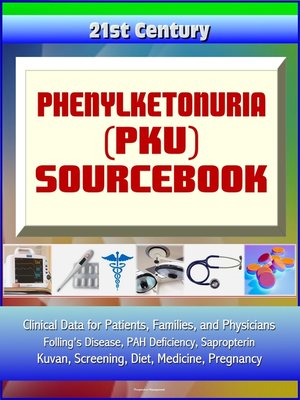21st Century Phenylketonuria (PKU) Sourcebook
ebook ∣ Clinical Data for Patients, Families, and Physicians--Folling's Disease, PAH Deficiency, Sapropterin, Kuvan, Screening, Diet, Medicine, Pregnancy
By Progressive Management

Sign up to save your library
With an OverDrive account, you can save your favorite libraries for at-a-glance information about availability. Find out more about OverDrive accounts.
Find this title in Libby, the library reading app by OverDrive.



Search for a digital library with this title
Title found at these libraries:
| Loading... |
This comprehensive ebook provides authoritative information and practical advice from the nation's health experts about phenylketonuria (PKU), also known as Folling's Disease or PAH deficiency. Starting with the basics, and advancing to detailed patient-oriented and physician-quality information, the 21st Century Sourcebook series gives empowered patients, families, caregivers, nurses, and physicians the information they need to understand PKU. There is extensive coverage of symptoms, diagnosis, medical testing, clinical research, drugs, Kuvan, diet, measurement of Phe blood concentrations, potential treatments, and much more.Contents: Part 1: Phenylketonuria (PKU) Overview - National Institute of Child Health and Human Development (NICHD) * Part 2: Highlighted NICHD-Sponsored Research: Low Phenylalanine Diet for Mothers With Phenylketonuria (PKU) * Part 3: Genetics Home Reference * Part 4: FDA * Part 5: National Human Genome Research Institute * Part 6: U.S. Preventive Services Task Force * Part 7: Office of Rare Diseases Research of the National Center for Advancing Translational Research * Part 8: Centers for Disease Control (CDC) * Part 9: PKU Clinical Trials * Part 10: Phenylketonuria (PKU) Scientific Review Conference: State of the Science & Future Research Needs, February 22-23, 2012 with Conference Summary Documents * Part 11: Consensus Development Conference Statement on Phenylketonuria: Screening and Management, October 16-18, 2000This edition includes our exclusive Guide to Leading Medical Websites with updated links to 82 of the best sites for medical information, which let you quickly check for updates from the government and the best commercial portals, news sites, reference/textbook/non-commercial portals, and health organizations.Phenylketonuria (commonly known as PKU) is an inherited disorder that increases the levels of a substance called phenylalanine in the blood. Phenylalanine is a building block of proteins (an amino acid) that is obtained through the diet. It is found in all proteins and in some artificial sweeteners. If PKU is not treated, phenylalanine can build up to harmful levels in the body, causing intellectual disability and other serious health problems.The signs and symptoms of PKU vary from mild to severe. The most severe form of this disorder is known as classic PKU. Infants with classic PKU appear normal until they are a few months old. Without treatment, these children develop permanent intellectual disability. Seizures, delayed development, behavioral problems, and psychiatric disorders are also common. Untreated individuals may have a musty or mouse-like odor as a side effect of excess phenylalanine in the body. Children with classic PKU tend to have lighter skin and hair than unaffected family members and are also likely to have skin disorders such as eczema.Less severe forms of this condition, sometimes called variant PKU and non-PKU hyperphenylalaninemia, have a smaller risk of brain damage. People with very mild cases may not require treatment with a low-phenylalanine diet.






